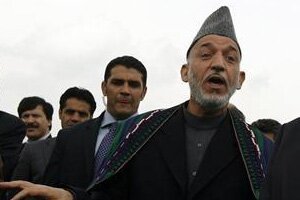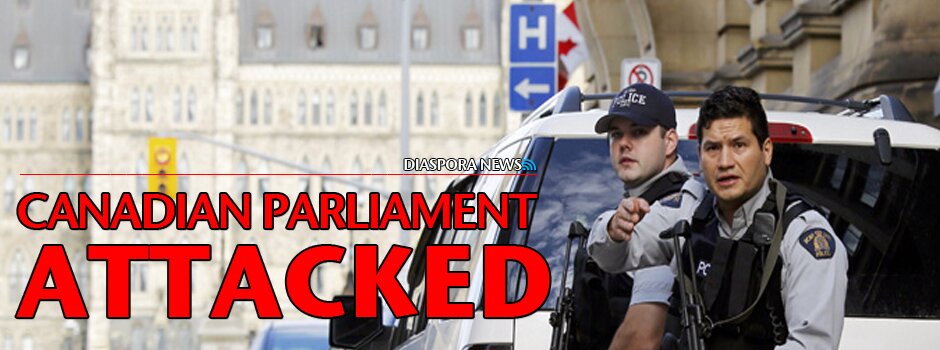Karzai registers for election, running mate criticized
 KABUL (Reuters) – Afghan President Hamid Karzai registered to run for re-election on Monday, but was criticized for naming a former guerrilla chief accused of rights abuses as his senior running mate.
KABUL (Reuters) – Afghan President Hamid Karzai registered to run for re-election on Monday, but was criticized for naming a former guerrilla chief accused of rights abuses as his senior running mate.
As the August 20 election draws closer, Karzai appears to be approaching an all but unassailable position, with the opposition struggling to name a contender with a broad enough support base to win.
“I have taken this decision for the welfare and interest of the people of Afghanistan,” Karzai, who has led Afghanistan since 2001, said of his decision to seek a second term.
“We will endeavor to bring security, peace and tranquility to Afghanistan,” he told reporters outside the offices of the electoral commission. “As in the past, we will make mistakes … but we will be in the service of the Afghan nation.”
Karzai selected former Defense Minister Mohammad Qasim Fahim as his senior vice president, ignoring the pleas of the head of the United Nations mission in Afghanistan who met the president several times in recent days to persuade him to pick someone else.
U.N. envoy Kai Eide was “saddened” and “disturbed” by the choice of Fahim, a one-time guerrilla chief rights groups have linked to accusations of abuse, said a source close to Eide.
Brad Adams, Asia director of New York-based watchdog Human Rights Watch, said: “To see Fahim back in the heart of government would be a terrible step backwards for Afghanistan.”
“He is one of the most notorious warlords in the country, with the blood of many Afghans on his hands from the civil war.”
Fahim could not be immediately reached for comment.
After registering, Karzai left for Washington to meet U.S. President Barack Obama for the first time since his inauguration.
Relations between Karzai and the new U.S. administration have been strained because of senior U.S. officials’ open criticism of Karzai’s effectiveness at tackling corruption, but U.S. officials have toned down their comments lately.
The United States is more than doubling its troops in Afghanistan this year, from 32,000 at the start of the year to a projected 68,000 by year’s end. Violence has reached its highest level since the Taliban’s 2001 overthrow and Obama has declared Afghanistan and Pakistan to be a U.S. foreign policy priority.
The Taliban, mounting an insurgency in the south, called the election a fraud by Washington and urged Afghans to boycott it.
In a statement on militant Web site alemarah1.org, Mullah Abdul Latif Mansoor, the head of the Taliban’s political commission, said guerrillas would fight until all foreign troops left Afghanistan and the poll would not change their stance.
At least 27 people were killed in attacks on Monday, including a provincial mayor blown up by a suicide bomber, a common Taliban tactic. A roadside bomb killed 12 civilians.
FRAGMENTED OPPOSITION
For the second vice presidential post, Karzai retained Karim Khalili, who has occupied the post since 2004. Karzai is a Pashtun from the country’s largest ethnic group, while Fahim and Khalili represent the second and third-largest groups, the Tajiks and Hazaras, giving Karzai’s ticket ethnic balance.
Fahim had been a founder and leader of an opposition group until he quit to back the president this month, a sign of the difficulty the opposition has had uniting against Karzai.
One possible rival to Karzai, Gul Agha Sherzai, a powerful governor with backing among southern Pashtun tribes, withdrew from the race abruptly on Saturday, apparently to back Karzai.
Other possible rivals include former Foreign Minister Abdullah Abdullah, former Finance Ministers Ashraf Ghani and Anwar ul-Haq Ahadi, and even possibly Afghan-born ex-U.S. envoy to Afghanistan, Iraq and the United Nations, Zalmay Khalilzad.
Most are technocrats with careers abroad and narrow political bases inside Afghanistan.
Candidates have until May 8 to register.
Karzai took power as part of an internationally brokered deal after U.S.-backed Afghan forces led by Fahim toppled the Taliban in 2001, and has remained in office since winning Afghanistan’s first democratic presidential vote in 2004.
(Writing by Golnar Motevalli and Peter Graff; Editing by Jon Hemming)
Comments
comments
 Calendar
Calendar

































